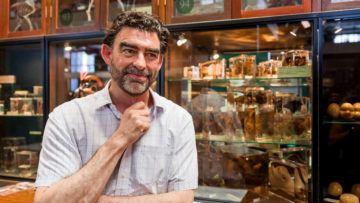Viviane Callier in Quanta:
 All living cells power themselves by coaxing energetic electrons from one side of a membrane to the other. Membrane-based mechanisms for accomplishing this are, in a sense, as universal a feature of life as the genetic code. But unlike the genetic code, these mechanisms are not the same everywhere: The two simplest categories of cells, bacteria and archaea, have membranes and protein complexes for producing energy that are chemically and structurally dissimilar. Those differences make it hard to guess how the very first cells met their energy needs.
All living cells power themselves by coaxing energetic electrons from one side of a membrane to the other. Membrane-based mechanisms for accomplishing this are, in a sense, as universal a feature of life as the genetic code. But unlike the genetic code, these mechanisms are not the same everywhere: The two simplest categories of cells, bacteria and archaea, have membranes and protein complexes for producing energy that are chemically and structurally dissimilar. Those differences make it hard to guess how the very first cells met their energy needs.
This mystery led Nick Lane, a professor of evolutionary biochemistry at University College London, to an unorthodox hypothesis about the origin of life. What if life arose in a geological environment where electrochemical gradients across tiny barriers occurred naturally, supporting a primitive form of metabolism while cells as we know them evolved?
More here.
